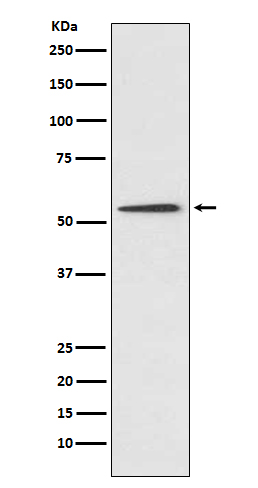
| WB | 咨询技术 | Human,Mouse,Rat |
| IF | 咨询技术 | Human,Mouse,Rat |
| IHC | 咨询技术 | Human,Mouse,Rat |
| ICC | 技术咨询 | Human,Mouse,Rat |
| FCM | 咨询技术 | Human,Mouse,Rat |
| Elisa | 咨询技术 | Human,Mouse,Rat |
| Aliases | Activation peptide; Anticoagulant protein C; APC; Autoprothrombin IIA; Blood coagulation factor XIV; PROC1; THPH3; THPH4; Vitamin K dependent protein C; ;PROC |
| WB Predicted band size | 52 kDa |
| Host/Isotype | Rabbit IgG |
| Antibody Type | Primary antibody |
| Storage | Store at 4°C short term. Aliquot and store at -20°C long term. Avoid freeze/thaw cycles. |
| Species Reactivity | Human |
| Immunogen | A synthesized peptide derived from human PROC |
| Formulation | Purified antibody in PBS with 0.05% sodium azide,0.05% BSA and 50% glycerol. |
+ +
以下是关于Protein C抗体的3篇参考文献及其摘要概括:
1. **文献名称**:*"Monoclonal Antibodies to Human Protein C: Tools for Structural and Functional Analysis"*
**作者**:Griffin JH, et al.
**摘要**:该研究报道了针对人Protein C的单克隆抗体制备,用于分析其结构域功能和凝血调控机制,揭示了抗体在抑制Protein C抗凝活性中的作用。
2. **文献名称**:*"Protein C Activation and Its Role in Blood Coagulation Regulation"*
**作者**:Rezaie AR.
**摘要**:通过特异性抗体阻断实验,阐明了Protein C被凝血酶-血栓调节蛋白复合物激活的分子机制,及其在抗凝血和抗炎通路中的关键功能。
3. **文献名称**:*"Genetic Mutations in Protein C Deficiency and Antibody-Based Diagnostic Approaches"*
**作者**:Reitsma PH, et al.
**摘要**:研究分析了遗传性Protein C缺乏症患者的PROC基因突变,并开发了基于抗体的ELISA检测方法,用于快速评估血浆中Protein C水平及功能异常。
4. **文献名称**:*"Clinical Utility of Protein C Antibody Assays in Thrombotic Disorders"*
**作者**:Goldenberg NA, et al.
**摘要**:评估了Protein C抗体检测在血栓性疾病中的临床应用,比较了不同抗体检测方法的灵敏度和特异性,支持其在先天性或获得性Protein C缺乏症诊断中的价值。
Protein C antibody is a crucial tool in studying the anticoagulant protein C, a vitamin K-dependent serine protease synthesized primarily in the liver. Protein C plays a pivotal role in regulating blood coagulation and inflammation by inactivating factors Va and VIIIa, thereby limiting thrombus formation. Deficiencies in protein C, either hereditary or acquired, are linked to thrombotic disorders like deep vein thrombosis. Antibodies targeting protein C enable its detection, quantification, and functional analysis in clinical and research settings.
These antibodies are typically monoclonal or polyclonal, designed to recognize specific epitopes on protein C, such as its light chain, heavy chain, or activation peptide. They are widely used in immunoassays (ELISA, Western blot), immunohistochemistry, and functional assays to diagnose protein C deficiency, monitor anticoagulant therapy, or investigate its role in sepsis, cancer, or inflammatory diseases. Some antibodies distinguish between active/inactive forms or protein C precursors, aiding in mechanistic studies.
Challenges include ensuring specificity, as cross-reactivity with homologous proteins (e.g., protein S) may occur. Therapeutic applications, such as recombinant protein C for severe sepsis, have been explored, though clinical trials showed mixed outcomes. Today, protein C antibodies remain vital in thrombosis research and diagnostics, complementing modern anticoagulant therapies while deepening understanding of coagulation biology.
×